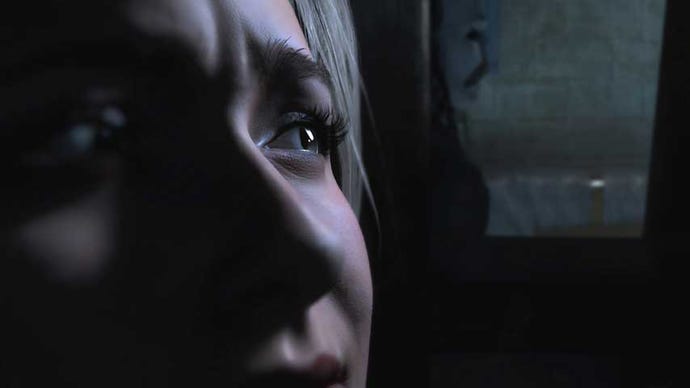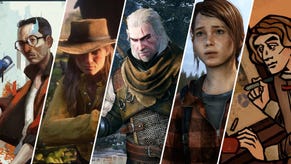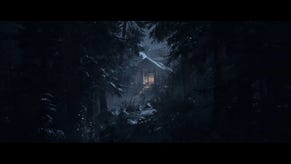Until Dawn is Telltale with unlimited time, funds and jump scares
Until Dawn is a graphical showcase and a jump scare romp with a startlingly bold approach to branching narratives. Spoiler-free.
Until Dawn began life as a PlayStation 3 exclusive - a Move title, in fact. I imagine that sometime during its development Supermassive sat down with a Sony executive and showed off what it was working on - an adventure inspired by teen slasher movies.
"Hmm," the Sony executive said. "That's pretty good. But..." The Supermassive team held its breath.
"What if we moved it to PS4 and gave you a metric s**t ton of money so that you can polish until it shines like the surface of a star? How about that?" the Sony executive concluded, taking out a pen and signing a cheque for eleventy gazillion billion trillion dollars.
"Why don't you just make this thing look so gloriously lovely that Quantic Dream goes home crying?" the executive added, emptying their pockets into a pile on the table. "Just really get in there and make it supremely smooth and delicious, make it really smell new-gen," they added, taking off their watch and cufflinks and adding them to the stash.
And here we are in 2015 with Until Dawn, a game that will make other developers blow air sharply through pursed lips and whistle. It takes facial animation to an exciting new level of uncanny valley feelings. It does things with real time dynamic lighting that you probably won't even notice until you watch some bonus materials. It's a delightful thing to look upon, and a showcase for your PS4.
On top of all that: it's not bollocks. Hooray!
Until Dawn isn't a massive evolution of the horror genre, so put that expectation right out of your head. The clever stuff it does, asking you about your fears and your opinions of the characters, are used to shape your experience - but not so consequentially that you'll really feel the difference unless you have an overwhelming phobia (in which case, lie). This is not a game that will get inside you psychologically, I'm afraid.
Instead, it relies on tension and jump scares. If you don't like jump scares, don't bother with this one - but I must say I've never seen a game do them so well. You know it's going to happen, of course, and it happens over and over again, and yet each one is so perfectly crafted that they startle you anyway.
Still, it won't give you the kind of lingering fear the most successful horror games do. Although some of the content is certainly very creepy to think upon, it's not going to have you sprinting away from the light switch and leaping onto your bed, a thing grown adults sometimes do if they think about the Ring late at night. (I am a perfect barometer for this because I am gigantic scaredy cat. Yay me.) Plus it all gets very silly about two thirds of the way through, as horror tends to do whenever someone insists on bolting a cohesive plot onto it. ("We've got to have closure," someone with script writing experience says, even though closure is the least scary thing ever to happen.)
But let's put aside Until Dawn's success as a horror experience and talk about what it's like to play. Well, let's imagine Telltale had a really huge amount of money and the support of Sony Computer Entertainment's technical teams, and you're pretty much there. The environment and story progress in a linear fashion, and players interact with the game world mostly by dialogue choices, key decision points, and quick time events.
This sort of thing upsets the Game Police no end, but as we've repeatedly seen it makes for a compelling experience when matched with good writing and atmosphere. Until Dawn definitely squares up with the competition in that regards, and is certainly the only contender in the horror genre, but what makes it extra special is just how flexible its branching narrative is.
Most of these kinds of games really only offer one storyline, with some minor fluctuations in character, relationships and dialogue. Until Dawn is genuinely consequential - once you pass the initial set up and everyone is gathered in their totally-safe-and-definitely-not-an-obvious-horror-setting starting locations, you are almost immediately at risk of killing them off.
It's sort of only after the game ends that you can look back and see what your choices have wrought and the full scope of plot becomes apparent. There is so much room for variation that it's possible to miss entire segments of the game, usually by killing someone off.
The consequential choices kick off right away, too - things you do in the "safe" tutorials impact later events. There's an in-game menu called The Butterfly Effect to track your actions - but it won't tell you what consequence you've unlocked until it's happened. The number of factors that add up to each possible death is staggering. There's no rewind or save scumming until you've finished the game once, either, so you just have to grit your teeth and hope you did the right thing.
It's alarmingly easy to kill people by making bad choices, making good choices that compound with bad ones, or by fudging quick time events - by the way, these aren't aimed at casual players: if you don't know where the face buttons are by instinct you will faff up.
This is going to annoy the kind of player who wants to make a "perfect" playthrough right off the bat, as there's no obvious "correct" choice every time. On the other hand, it does mean everyone playing without a guide should get a different story, which is cool, and makes playing feel a lot less like pressing a button to advance the plot while it gets on with things.
One of the coolest things about Until Dawn is that your investigation actually matters. Searching each scene carefully turns up clues and totems. Totems are for you as the player, in that they provide glimpses of possible futures (many of which you won't see if you're lucky - or unlucky) but clues are for the characters. If you take the time to put the pieces together, the characters do too - and their dialogue and possible choices change as a result of that.
When was the last time a game presented you with a mysterious backstory unlocked through a bunch of collectibles - and provided you with a motivation to actually do the collecting, beside trophies or a completion statistic? This is a wonderful bit of integration which also piques your interest in the plot (not something impatient gamers are known for) and helps you understand what all the clues mean if you're a bit lost. The clues and totems are pretty well-hidden, too; some I stumbled across in the main path, but many lay down side paths, a number were cunningly hidden (for example, just out of frame in the "wrong" direction), and some I couldn't find at all, despite diligent searching.
At the end of my first Until Dawn playthrough only two characters had survived. I don't want to say any more than that. I don't know if it's possible to save the whole lot, even knowing what I do now, even if I found all the clues. When I think about how I gave the [SPOILERS] to [SPOILERS] and he [SPOILERS], but then later on he [SPOILERS] because [SPOILERS] and then of course she also [SPOILERS] and then Ashley said [SPOILERS] and because of that at the very end [SPOILERS][SPOILERS][SPOILERS]? Well. I dunno. Butterfly effect, innit.
I'm gonna go find out. A second playthrough, at this time of year? You betcha. Says a lot, I think.
Until Dawn arrives on PS4 on August 25 in North America and August 28 in Europe. Beware spoilers and go in clean.














